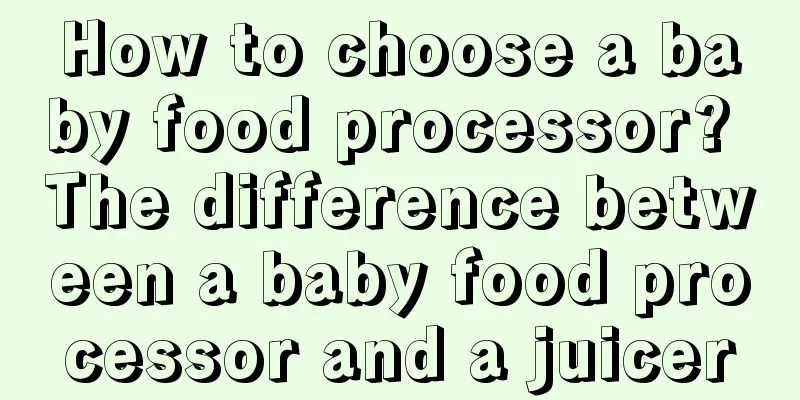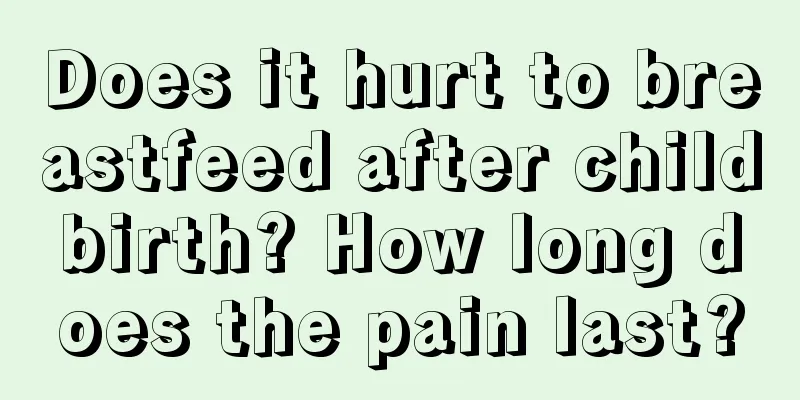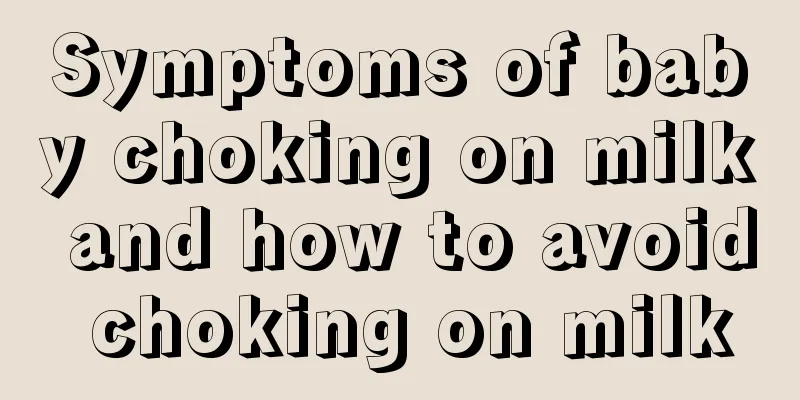Will breastfeeding cause lactose intolerance? Will breastfeeding lead to overfeeding?

|
Breast milk is the best food for babies, but many mothers think that their milk supply is abundant and they are worried that overfeeding will be bad for their baby’s gastrointestinal tract and development. Today I will tell you whether breastfeeding will lead to overfeeding and lactose intolerance. Does breastfeeding lead to overfeeding?Children who are exclusively breastfed are less likely to be overfed, but children who are fed a mixture of formula and breast milk are more likely to be overfed. Generally speaking, babies have the instinct to regulate their energy intake, but this instinct is more reflected in breastfeeding. Changsha lactation consultant Luo Yu reminds mothers not to worry about "overfeeding" of babies who are exclusively breastfed due to frequent feeding. Although some babies have a high need to suck, every bite and every meal they eat is actually "controlled" by themselves, and they are not eaten accidentally out of necessity. Therefore, breastfeeding is both nutritious, healthy and safe compared to bottle feeding. If mothers want their babies to grow up healthily, it is best not to bottle feed, and mothers with less milk should increase milk supply as soon as possible. Can breastfeeding cause lactose intolerance?Breastfeeding may cause symptoms of lactose intolerance, but it does not mean that if you have lactose intolerance, you must refuse breastfeeding. According to data released by the National Health and Family Planning Commission, the breastfeeding rate in my country has been declining continuously, falling by nearly 40% in 16 years. The exclusive breastfeeding rate for babies aged 0-6 months is 27.8%, far below the international average (38%). Among the reasons for giving up breastfeeding, lactose intolerance in babies is another very important factor. A research report shows that the lactase deficiency rate in normal babies in China is nearly 50%, and up to 88% of infants and young children will have lactose intolerance symptoms after 2 weeks of diarrhea. Many mothers will give up breastfeeding and choose lactose-free formula milk powder because of their baby's lactose intolerance, which makes the baby lose the most ideal natural food in the baby stage in vain - economic, safe, not prone to allergic reactions, and the ratio of nutrients and various nutrients contained in it, and immune active substances. But in fact, baby lactose intolerance can be corrected by appropriate means, and there is no need to give up breastfeeding. Lactose is extremely important for the early development of infants, especially for the development of the brain and nervous system, and the promotion of calcium absorption. Avoiding lactose intake will affect the baby's early development. Choosing to give up breastfeeding and switch to lactose-free formula milk will not only increase the feeding cost unnecessarily, but also be counterproductive to the baby's early development. Doctors recommend adding lactase drops to the milk (breast milk or formula) fed to babies to supplement enough lactase to break down and digest lactose, while helping to stimulate the baby's intestinal wall to secrete lactase, prompting correction and improvement of the baby's digestive system's ability to adapt to lactose. Choosing lactase drops, on the one hand, does not require the baby to feed additional liquid before feeding, which affects the baby's normal milk intake. On the other hand, the in vitro decomposition of lactose can ensure higher effectiveness and fully guarantee the baby's nutrient absorption during the critical period of growth and development. Do breastfeeding babies need extra water?Qiao Ma said: Mom, are you going to starve me to death? Breast milk and formula milk are mostly water. Babies who have not added complementary foods within 6 months generally do not need additional water unless there are special circumstances. Babies can only drink a little water when they have yellow urine or fever. No additional water is needed at other times. Excessive water intake will increase the burden on the baby's kidneys. The World Health Organization defines exclusive breastfeeding as feeding the baby only with breast milk and not giving any liquid or solid food other than medicines, vitamins, and mineral drops. Do you understand? This means that if you want to exclusively breastfeed your baby within 6 months of age, not only can you not feed your baby complementary foods, but you can't even add water, fruit juice, or vegetable juice. |
<<: What is the cause of back pain after childbirth? How to treat back pain after childbirth?
>>: What is Neck Drowning and How to Prevent It
Recommend
What should I do if my baby chokes on milk? What happens if my baby chokes on milk?
It is very common for babies to choke on milk, bu...
What causes a baby's stuffy nose? What should I do if my baby spits up milk due to a cold?
Nasal congestion is the most common symptom of a ...
What are the reasons for insufficient milk after childbirth? What should I do if I have insufficient milk after childbirth?
Many mothers will encounter this problem after gi...
How to quickly defecate after childbirth constipation? Be careful to avoid these misunderstandings
Many mothers who have just given birth will encou...
Can electric blankets remove moisture? Can pregnant women use electric blankets?
The national regulations stipulate that the servi...
What causes baby milk powder allergy? Identification and treatment of milk powder allergy
When many babies drink milk powder, due to differ...
Why don't you cover your baby's feet when he sleeps? Why does his feet get hot when he sleeps?
When babies sleep, in order to prevent them from ...
What should I do if my child lacks confidence? How can I make my child confident and bold?
The influence of the original family may last a l...
Can babies with bloating sleep on their stomachs? Can babies with bloating drink honey water?
Many babies are likely to experience bloating aft...
What should I do if my baby always wakes up during sleep? How to improve my baby's sleep
It is very difficult for parents to coax their ba...
How long does it take for a baby's fever to subside? How long does a baby's fever last?
When a baby has a fever and is sick, it will make...
How can we promote the secretion of growth hormone? What are the methods to promote the secretion of growth hormone?
Growth hormone determines a person's height d...
What are the dangers of children crossing their legs?
Many people like to cross their legs involuntaril...
How to prevent baby food poisoning How to prevent baby food poisoning
The baby's diet is something that all mothers...
Should I bring a breast pump to the hospital to start breastfeeding? Is it necessary to sterilize the breast pump every time I use it?
A breast pump is a tool used by mothers to feed t...









